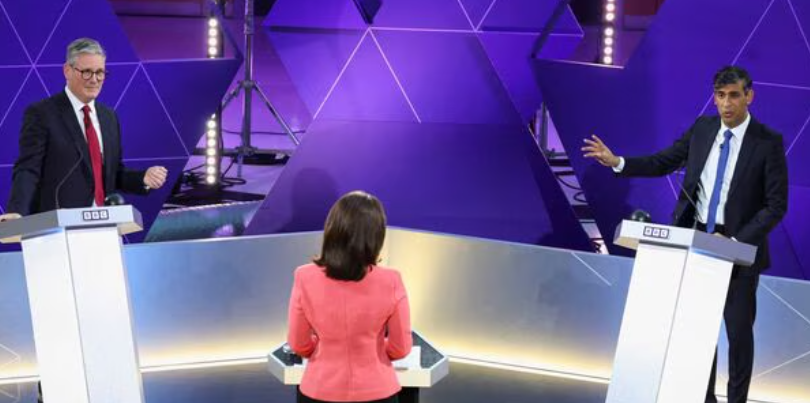Delhi and a New London (GS Paper 2, IR)

Introduction
- As the Tories in Britain face a historic defeat in tomorrow’s elections, India is well-positioned to advance bilateral relations under a potential new Labour government led by Keir Starmer.
- It is also an opportune time for New Delhi to reassess its perspective on London’s Labour government.
India-UK Relations Under the Conservative Party’s 15-Year Rule
- Under the Conservative Party, there has been a positive reorientation of ties between London and Delhi.
- Shedding some of Britain’s colonial baggage, the Tories have reframed engagement with India within a broader Indo-Pacific framework, rather than being solely influenced by the Pakistan and Kashmir factors.
- They have also negotiated a roadmap for transforming bilateral relations across various domains, including green transition, defence, new technologies, and maritime security.
- Additionally, the Migration and Mobility Agreement has helped address challenges related to illegal immigration and facilitated the flow of Indian talent into the UK.
Persistent Irritants in the Relationship
- Despite progress, some issues remain unresolved.
- Delhi is still concerned about the impunity enjoyed by anti-India activities in Britain.
- There is enduring resistance within Britain’s permanent establishment to a fresh relationship with India.
- Additionally, “anti-colonial” posturing in India, both on the left and right, prevents the establishment from fully seizing the possibilities with Britain.
Sour Memories from Labour Party’s Rule for India
- Labour’s return to power might rekindle some of India’s anxieties about bilateral ties.
- The late 1990s, during Labour’s tenure, saw a significant downturn in India-UK relations.
- Queen Elizabeth II’s visit to India in 1997, intended to signal post-colonial reconciliation, became a lesson in how not to organize major diplomatic events.
- During the mission’s stopover in Pakistan, British Foreign Secretary Robin Cook suggested mediating on the Kashmir issue, prompting Indian Prime Minister Inder Kumar Gujral to dismiss the offer and criticize Britain’s perceived post-imperial delusions.
- Prince Philip’s remark about the Jallianwala Bagh massacre death count further soured the visit, leading to a massive uproar in India.
- Despite British PM Tony Blair’s efforts to limit the damage, the squabbling over Pakistan and Kashmir continued to cast a shadow over bilateral relations under Labour’s tenure.
Potential for Labour’s Return to Open Old Wounds
- This scenario seems unlikely under Starmer’s leadership. Starmer has quelled the anti-India sentiment within the Labour Party ignited by Jeremy Corbyn.
- The Labour Manifesto’s references to Kashmir in the 2019 elections triggered a storm in Delhi and mobilized the Hindu community to support the Tories.
- However, Starmer has sought to crush radical ideologies, curbing the free run of anti-India groups.
- He has signaled an intent to build on the foundations laid by the Tories. Labour is reaching out to the Hindu vote, as are the Tories.
- Starmer’s presence at the Swaminarayan Temple in Kingsbury, promising to protect British Hindus’ interests, is a testament to this.
- However, Labour cannot ignore other minorities, including the Pakistani diaspora, which stands at 1.2 million (compared to the Indian diaspora at 1.5 million).
- UK-based Khalistani groups will continue to lobby the new government to push an anti-India agenda.
Diplomatic Tasks for Delhi
For Delhi, navigating India’s domestic politics and the fractures of the Subcontinent resonating within the large South Asian diaspora in the UK is crucial. Like in most democracies, UK retail politics involves cultivating vote banks. Delhi, then, has a two-fold task.
- Engage with All Stakeholders in the UK to Curb Anti-India Activities
- Delhi must maintain pressure to curb anti-India activities in the UK.
- It must also intensify engagement with the “deep state” in Britain to establish sensible protocols for managing issues arising from the UK’s large and growing South Asian diaspora.
- Positively Engage with the UK
- Building on the positive potential is essential to limit the salience of negative factors. Shedding misperceptions about Britain is equally important.
- Contrary to Gujral’s “third-rate power” comment, Britain’s GDP in the mid-1990s was higher than China and India combined.
- Today, while India’s economy is slightly larger than Britain’s (nearly $4 trillion compared to $3.5 trillion), India, with a per capita income of less than $3,000 (compared to Britain’s $50,000), has much to gain from a deeper partnership with London.
UK’s Significance for India
- Delhi should stop underestimating Britain’s relative importance.
- India’s exports to Britain, at nearly $30 billion, are nearly six times its exports to Russia.
- Although far behind the US and China, Britain remains among the front-ranking middle powers.
- Its financial clout, technological depth, and global reach make Britain a force multiplier for a rising India.
- As Starmer nudges Labour towards political moderation, he offers India an opportunity to strengthen ties with Britain.
- David Lammy, expected to be the next foreign secretary, recently laid out an ambitious vision for India-UK relations, criticizing the Tories for over-promising and under-delivering.
- Labour is ready to push forward on the free trade deal and advance technological and defence cooperation.
Conclusion
- New Delhi must not view the potential new Labour government with preconceived notions.
- The new Labour party has signaled a moderate stance on India’s immediate concerns.
- It is time for India to stop underestimating the UK’s importance and embark on energized economic and political engagement with Britain.


